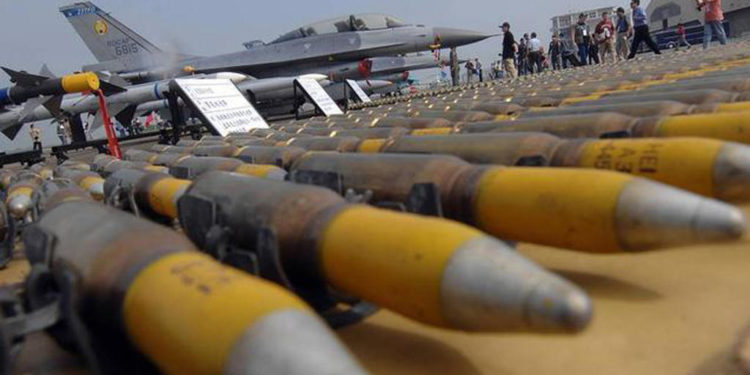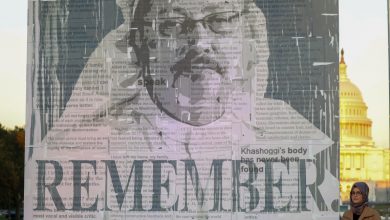Pressures on France to Stop Arms Sales to Saudi Arabia

Demands are rising on France to halt arms sales to Saudi Arabia and the United Arab Emirates. The pressures have been a political dilemma for the French government, which has been criticized by local and international non-governmental organizations.
The French want to take this decision against Saudi Arabia, like Germany, which decided in October 2018 to ban the arms sales to Saudi Arabia, but the government of the President Emmanuel Macron did not do the same, asserting on its responsibility for arms deals with Saudi Arabia and the UAE and not using them on civilians in Yemen.
The French government says it respects its international obligations, that the Arms Trade Treaty and the European Common Position on Arms Export do not oblige their signatory states to stop exporting arms to a nation involved in the war.
They only require arms exporting countries to assess the situation so that their weapons are not used in war crimes. France’s official position suggests that its weapons have not been used for war crimes.
As the intervention in Yemen began in March 2015, and there are suspicions and even evidence of the use of French weapons sold to Saudi Arabia and the UAE to commit war crimes in Yemen. Therefore, an export assessment is necessary and logically leads to the suspension of the arms export license for both countries.
The International Arms Trade Treaty regulated the sale of conventional weapons (small arms, tanks, fighters, ships) and entered into force in December 2014, signed by 134 countries and ratified by 101 countries.
The treaty states in Article (6) “a State Party shall not authorize any transfer of conventional arms… if it knows at the time of authorization that the arms or items would be used in the commission of genocide, crimes against humanity. attacks directed against civilian objects or civilians protected as such, or other war crimes…” Article (7) on export and export assessment obligates arms-exporting States to initiate an objective assessment of the issue before granting export authorization to ensure that there are no risks of serious violations referred to in the text of the treaty and if the assessment finds that there are risks of such grave violations.
Four years after the war in Yemen, and among increasing calls by NGOs criticizing the French position, the question of French weapons used in Yemen has become controversial.
On Wednesday, where MPs are concerned about the sale of French arms to Saudi Arabia and the UAE and their use in their war in Yemen, the National Assembly listened to the French Minister of the Armed Forces, Francoise Barley.
The deputies want to know whether France has breached its international obligations, particularly Article VI of the ATT, by selling weapons to both countries, but their powers are limited, and the executive authority controls the export of weapons.
The hearing did not come with any result, because the parliamentary majority (President Macron’s party) emptied it of content to avoid debate and controversy. At the hearing, the Minister echoed the same argument: “There is no evidence” of the use of French weapons for crimes against civilians in Yemen, ignoring all the evidence provided by NGOs and the media. The French government is simply refusing the evidences. But the problem is not that simple, because the war in Yemen continues, and the risk of crimes against civilians are most likely to increase.
Even if this war stops, the file will not be closed, because other evidence will prove the use of French weapons to commit war crimes in Yemen, which could expose French officials to future judicial proceedings.
The country’s interests interpret the French official position. First, on the level of French military industries and their development depends on the size of deals sold to other countries, and the value of these deals. Thanks to transactions with the Gulf countries, French arms exports are recovering.
The annual report published by the Ministry of the Armed Forces on June 4, 2019, praises the “dynamism” of the French military industry, stating that this sector represents 13% of the jobs in French industries.
Second, arms export earnings: France’s revenues from the sale of arms amounted to more than 9 billion euros in 2018. Saudi Arabia (and the Gulf countries in general) are the main countries importing French arms. Thirdly, international competition in military exports – as in civilian exports –, maintaining market position and gaining new stakes in it is a strategic bet, especially if the latter is promising, as is the case with the Gulf military market.
Therefore, arms exporters rarely dare to make decisions that may make them lose market share to their competitors.
Fourthly, France links Saudi Arabia and the UAE with strategic relations (armament, military training, maintenance contracts, as well as a French military base in the UAE). Fifthly, France relies financially on Saudi Arabia and the UAE to support its strategy in some areas: Sahel-5, held in Brussels on February 2018 under the leadership of France, Saudi Arabia, and the UAE committed themselves to support the joint power of the Sahel-5 Group financially by giving them respectively $ 100 million and $ 30 million.
However, using French weapons in the war in Yemen will continue to interact, especially as it poses a dilemma faced by democracies, which is difficult in its foreign policy, between moral considerations (human rights in particular) and interests.





